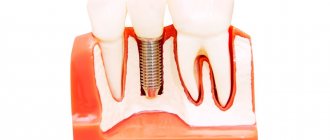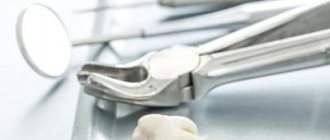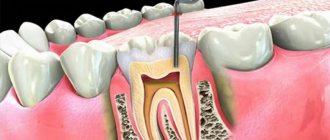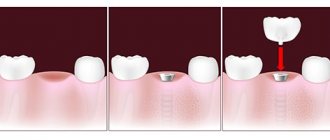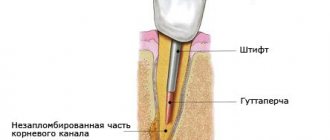Dental implantation is an effective solution for those who have lost one or more teeth. With its help, you can restore a beautiful and healthy smile, as well as stop bone atrophy. However, this method of treatment scares some people away because of possible complications, but they can be avoided if you know what we are talking about and how to do it.
In this material we will talk about what complications can occur after dental implantation. Let's immediately divide them into 2 groups:
- Natural, completely normal, appearing as a result of surgery and tissue injury. They do not pose a threat to the patient’s health.
- Dangerous complications that require immediate medical attention. They are the result of an incorrectly performed operation or indicate problems in the body.
| Good to know! According to statistics, the risk of serious postoperative complications causing implant rejection is extremely small and amounts to only 1-2%. |
Why does swelling occur after dental implantation?
In general, swelling is a completely normal reaction of the body to injuries. All this is nothing more than an influx of lymph to damaged tissues (i.e., accumulation of fluid in a certain area). This way the body’s natural defenses are activated. Swelling forms within 2-3 days - it reaches its peak on the third day after surgery. After this, the swelling of the tissues should gradually decrease and disappear completely within a week.
When installing classic two-piece implants, when the flap method with gum peeling is used, the likelihood of tissue swelling is much higher. Patients with pathologies of the cardiovascular system and diabetes mellitus are also at risk.
Care
Take anti-inflammatory medications as prescribed by your doctor
After the operation, the soft tissues around the implant become very sensitive, so oral care is carried out with specially selected paste and a brush with soft bristles.
You need to complete the hygiene procedure by rinsing your mouth with an antiseptic. According to the recommendations of a specialist, you should take medications on time that have an anti-inflammatory and antiseptic effect , which prevents implant rejection.
Inappropriate oral hygiene or lack thereof can provoke inflammation and implant rejection. Due to the accumulation of food debris and the proliferation of pathogenic microbes, a favorable environment for inflammation is created, which often leads to rejection of the implanted implant.
How to distinguish normality from pathology
On the one hand, tissue swelling is a normal consequence of the body, on the other hand, this symptom can become a manifestation of an inflammatory process that requires surgical therapy.
If the swelling does not have positive dynamics, that is, does not decrease 3-4 days after installation of the implants, if symptoms such as redness of the gums, monotonous or pain when pressing, increased body temperature, pus that is released from the area around the implant are added - all this speaks of a serious inflammatory process, i.e. peri-implant. And, most likely, implant rejection. If such phenomena occur, you should immediately consult a doctor.
You should also be wary of a situation where the swelling has already subsided, but reappears after some time. This situation again requires immediate consultation with a specialist.
Each patient of the Smile-at-Once clinic is assigned an individual manager, whom you can contact for advice in case of doubt. You will be connected with a doctor by telephone or an appointment will be made for an in-person appointment.
Complications during implant healing
The most serious complications are possible during the fusion of the implant surface with the jaw bone. Among them are the inflammatory process around the titanium analogue of the tooth root and its rejection.
Peri-implantitis
Inflammation of the tissues surrounding a dental implant is called peri-implantitis. The disease occurs due to infection in the space between the gum and the body of the implant. This is possible if the wall of the paranasal sinus is damaged, the postoperative wound is improperly closed, there is inflammation in the adjacent tooth, or inaccuracy in the manufacture of the crown. But the most common reason is a banal lack of oral hygiene by the patient. Inflammation is accompanied by the formation of swelling, bleeding, and pain. If there is no treatment at the initial stage, the disease becomes chronic. Then the infection “eats away” the jaw bone, and the implant becomes mobile. In this case, it is necessary to remove the artificial tooth and treat the hole. Peri-implantitis is a fairly rare phenomenon, occurring in 1–2% of cases*.
Implant failure
Failure of the jaw bone to accept a titanium rod implanted into it is characterized as rejection. The causes may be infectious processes around the implant (peri-implantitis), surgical trauma, lack of bone tissue, smoking immediately after surgery, exacerbation of chronic diseases, and, extremely rarely, an allergy to titanium. The onset of the rejection process can be identified by signs such as implant mobility and pain in the surgical area. In such cases, the artificial root is removed from the hole and a complex of vitamins is prescribed to strengthen the bones. Re-implantation is possible after 1 – 2 months. With a competent doctor’s approach and the patient’s compliance with all instructions, the chance of encountering this unpleasant problem is less than 1%*.
How to reduce swelling after implantation
The main thing you need to do after implantation is to rest well and expect the outcome to be favorable. Your doctor performed the operation successfully, so now how the rehabilitation period goes depends only on you. Read our useful guide after dental implantation, which details what you need to prepare at home in advance and how to solve any problems that arise.
How to apply compresses? This is the most basic method that allows you to relieve tissue swelling. It is especially effective in the first day and even in the first hours after installation of implants.
Proceed as follows: use ice, a heating pad with ice water, or any food from the freezer. But don't overdo it, i.e. do not cause frostbite and tissue necrosis. The procedure is as follows: wrap ice in a towel or 2-3 layers of gauze/thin fabric, apply to the cheek on the side of the surgical intervention, hold for 5-10 minutes. The duration of the compress is 5-10 minutes, breaks are 3-5 minutes. The number of approaches is 7-10 times, for approximately 1.5-2 hours. Such courses can be repeated periodically during the first day.
How to eat properly to avoid swelling? In addition to solid foods (for any implantation protocols, even if the prosthesis was installed immediately), you must exclude excessively hot, spicy and salty foods, coffee, and spices from your diet. Caffeine, for example, increases blood pressure, which contributes to an even greater rush of blood to the head and, accordingly, increased tissue swelling.
Hot foods and drinks are prohibited, as they can lead to increased swelling. Hard - because they can injure the operated area and displace the installed implants. All of the above restrictions are in effect for a week.
Andrey Nikolaevich, 45 years old
“The operation went quickly for me, under anesthesia. I went home fully conscious and without much pain. I expected that when the anesthesia wore off, the pain would be unbearable, there would be severe swelling... Having covered myself with the recommended pills, I waited while I made compresses. The tablets were bought in vain. At night I slept as usual. In the morning I also didn’t experience anything special, there was almost no swelling. On the evening of the first day I came for my first fitting. On the third day, the prosthesis was installed - everything went perfectly!”
“If the doctor is a professional, then rehabilitation will take place very quickly, without pain and without swelling. Tested for myself! "
watch a video with the patient
How should you sleep after implantation? It is necessary to ensure the outflow of blood from the head; it is better to sleep with your head elevated. You can place several pillows under or on the mattress, thus increasing the angle of inclination. Many patients note that after surgery there is a feeling of pulsation in the head. Such a measure will also relieve such a symptom.
Is it possible to visit swimming pools and saunas? To relieve swelling, you need cold. Therefore, not only saunas and swimming pools are prohibited in the first week after installation of implants, but also long stays in a hot bath. It is better to limit yourself to a warm shower.
What medications will help against tissue swelling? After installation of the implants, the patient is prescribed drug therapy. We deliberately do not indicate the names of medications, because in each specific case medications are prescribed individually. But the complex necessarily contains anti-inflammatory and antihistamine drugs, which help reduce tissue swelling. Patients who have problems with the heart and blood vessels, high blood pressure, are also recommended to take appropriate medications.
On the 3rd day after implantation, the patient is scheduled for a preventive examination: the doctor will assess the condition of the tissues, the dynamics of healing and give the necessary recommendations. If you have doubts earlier, you should not wait for a scheduled visit; you can see a doctor earlier.
"Normal" pain
The doctor always warns the patient about the occurrence of discomfort after the anesthesia wears off. Postoperative pain has the following characteristics:
- moderate strength;
- aching or cutting;
- weakens after using drugs.
The patient feels that the implants hurt after installation. But artificial roots do not have nerve endings. As a rule, the tissue in the area of implantation, the site of gum incision and sutures hurts. Irradiation (movement) of unpleasant sensations to nearby parts of the jaw, neck, ear, nose is possible.
Why does numbness occur after dental implantation?
The first hours after dental implantation, anesthesia continues to be active, especially if it was about installing several implants at once. As a rule, a conduction method is used, which ensures blocking of nerve endings for up to 5-6 hours. But the implantation procedure itself takes no more than 2-3 hours, so after it, numbness can actually persist: in some patients - for a couple of hours, in others - up to 5-6 hours. In both cases, this is the norm, and the duration of anesthesia depends on the condition of the body.
Slight numbness of facial tissues can persist for 2-3 days - it is inextricably linked with swelling. But if sensitivity is not restored, you should consult a doctor. The causes of this condition may be damage to the facial or jaw nerve: the sooner treatment is started, the higher the chance of completely restoring tissue sensitivity.
Read more about what facial neuralgia is as a complication after dental implantation >>>
Swelling and numbness are the body’s natural reaction to the “invasion” of a foreign body, that is, an implant. Take a mini-vacation from work for 3-4 days, try to lead a more measured pace of life, give up business trips and important business meetings - give your body rest, because it needs strength to recover. If you want to reduce the risks of any consequences and complications to zero, try to carefully approach the issue of dental implantation, trust your doctor and follow all his recommendations.
Causes of pain
During dental implantation, a foreign body is introduced into the alveolar ridge, which inevitably damages the gums, blood vessels, and bone tissue.
The body needs time to recover and adapt to the installed structure. At this time, inflammation develops in damaged tissues, which triggers the regeneration process.
Mechanical injury and fluid accumulation lead to irritation of nerve endings, which a person feels in the form of pain.
After suppressing the inflammation, the swelling goes away, the tissues are restored, and the discomfort gradually disappears.
What to do if it hurts a lot
Each patient receives recommendations from the doctor aimed at reducing discomfort in the postoperative period and reducing rehabilitation time. It is important not to cancel or replace medications without the permission of a specialist. Following the instructions exactly will eliminate severe pain.
After installing the implants it is necessary:
- Apply a cold compress immediately after surgery;
- 1.5 hours after the manipulations, start taking painkillers prescribed by your doctor;
- use prescribed antibiotics, observing the recommended frequency, dose and duration of treatment;
- Avoid drinking cold and hot drinks;
- Avoid crumbly, fibrous, spicy, hard foods;
- rinse the mouth after eating;
- sleep on your back or the side opposite to the intervention;
- exclude physical activity, overheating, hypothermia;
- stop smoking and drinking alcohol.
The cause of severe pain and postoperative complications is often the patient’s neglect of the doctor’s recommendations.
Review of medications that help relieve swelling
Medicines will help relieve swelling from the face after implantation. They can be used internally and externally.
Rinsing with antiseptics of synthetic or plant origin:
- Synthetic antiseptics : Chlorhexidine, Miramistin, Furacilin. Eliminates the risk of pus formation and abscess development. Rinsing is done every time after eating. In the first days they are replaced with oral baths. Keep the solution in your mouth for a minute and carefully spit it out. To prevent dry mouth, long-term use of Chlorhexidine is not recommended. Constantly rinsing with the drug can cause the development of candidiasis in the mouth.
- Herbal antiseptics include : chamomile, yarrow, calamus root, elecampane, oak bark. These plants have an anti-inflammatory effect and have astringent properties. An effective drug is Stomatofit, consisting of an extract of calamus rhizomes, oak bark, thyme, mint, and sage. It destroys many bacteria, candida fungus.
Ointments and gels eliminate swelling. The drugs are applied to the gum area, but they also act on swelling of the outer part of the face:
Drugs to eliminate swelling
- Cholisal is a gel containing choline salicylate that prevents the synthesis of prostaglandins that cause swelling and has an antimicrobial effect. Applications soaked in gel are placed at the site of edema formation.
- Solcoseryl is an ointment that accelerates tissue regeneration. It is applied to the gum. Before use, the tooth is treated with a solution of hydrogen peroxide.
- Metrogyl-Denta is an antibacterial gel. Prevents the development of infection, relieves swelling.
- Kamistad is an anesthetic antiseptic gel containing lidocaine. When used, numbness occurs in the gums and tongue.
- Asepta is a propolis-based gel with an antiseptic and anti-inflammatory effect.
- Parodontocide is a gel containing phenyl salicylate, which suppresses the synthesis of prostaglandins that cause swelling.
To relieve swelling and relieve pain, medications for internal use are prescribed:
- nonsteroidal anti-inflammatory and painkillers (Nimesulide, Analgin, Voltaren, Ketanov);
- antibiotics (Flemoklav, Augmentin, Amoxiclav).
Anesthesia during surgery
Numbness prevents you from feeling pain during surgery. Achieved by administering anesthetic drugs. If sensitivity returns and the procedure has not yet come to an end, the drug is added to prolong the effect of local anesthesia.
In rare cases, a substance used for pain relief or improperly administered anesthesia can cause longer-term numbness - up to six months.




